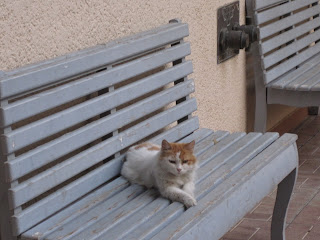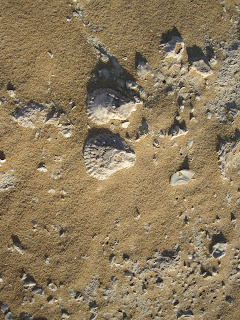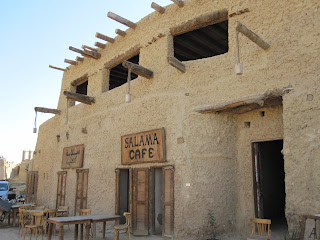Last weekend was the end of Ramadan so the embassy employees got a long weekend holiday. We went with a friend to a town called Siwa which is located in the Sahara desert about 100km from the Libyan border.
Siwa was built around a large oasis and is famous in history for being the site where the priests of the god Amon acknowledged Alexander the Great as both a god himself and a legitimate pharaoh of Egypt. Other than that, Siwa has been mostly isolated for thousands of years and only just got a paved road into the town in the 1980s.
The people who live in Siwa are Berbers and they speak a dialect of the Berber language. Arabic is as much a foreign language to them as English. Nevertheless, the education system is good and many people speak both languages well. Siwans harvest dates and olives to sell in Egypt and Europe, and they farm some of their land for their own needs as well. A major source of income is bottled water from the many fresh-water springs throughout the oasis. The culture is more conservative than the rest of Egypt- we never once saw any part of a Siwan woman's face, not even the eyes- but the people are noticeably friendlier than the average Egyptian.
Once we left the northern coast of Egypt to drive down to Siwa, we saw miles and miles of this:
Every once in a while we would pass a small police station or herd of camels, but there was no doubt we were far from civilization.
The Siwa oasis comes up all of the sudden out of the desert
and extends far enough out on the other side that you almost can't see the desert beyond, even from a hill above the town.
The trees are mostly date palm trees and they were nearing harvest time when we were there. The dates start out green, change to yellowish-orange, and then turn dark brown before they are picked.
On our first evening in Siwa the hotel manager, Salama, arranged for us to be driven out to the lake to watch the sun set. There was a little cafe with tables and chairs set up to watch the sun go down. We sat by the lake, and since it was still Ramadan that night the Siwans with us gathered separately to break their fast together. In Cairo the fast is broken with dates, hibiscus tea or fruit juice, and then the meal. In Siwa the fast is broken by drinking a milkshake made with fresh dates before the main meal.
We occupied ourselves taking pictures while the Siwans broke their fast.
Siwans are proud of their history, culture, and way of life and want to preserve it as much as possible. Even though they welcome the tourists who began coming when their road was built in the 80s, they work to keep all new development consistent with they way they have always done things. Our hotel was built at the base of the medieval fortress, Shali, and blended in completely with it.
(The hotel is just behind the shack, not the shack itself.) Most of the buildings in Siwa are built with bricks and mud. This convenient building material is both inexpensive and as cool as possible in the middle of the desert. The only drawback is when the infrequent rains come. Once in the 1920s there was rain three days in a row. Most of the houses in the town were destroyed, but could at least be quickly rebuilt!
Salama was the manager of the hotel, so of course they named the coffee shop on the first floor after him. :-) The first night we were the only guests and we were treated as much like family as hotel guests could be. They told us, 'This is
your home' over, and over, and over.
The hotel rooms all opened up onto this central courtyard. It was cleverly built so that the sun was never directly shining into the courtyard. The high temperature every day averaged around 110F so we were grateful to have this cool place to relax.
This is the breakfast room we ate in every day. Everything in the hotel except the ceiling fans, electrical wires, and light bulbs are made from natural materials. Even the lamps were carved out of blocks of salt.
This is the hotel's main restaurant, located on the roof. Behind the restaurant you can see the tower of a local mosque. This mosque is a Sufi mosque which Salama belongs to. Salama told us that the imam of this mosque is the kindest man you will ever meet. He welcomes all people to his mosque- Muslim, Christian, even Jews. Sufis are a minority sect of Islam, but in my opinion the most interesting. They emphasize a personal relationship with God over following strict rules and they have a strong musical worship tradition. They appear to be the Muslim equivalent of Pentecostal Christians.
Siwa is a fairly small town of only about 20,000 people and is not highly developed. The fence you see on the right is made of palm leaves- another very effective and economical building material.
There are cars and trucks, but not many. Most people get around by walking or donkey cart. I don't know if this is true of all donkeys, but Siwan donkeys are very vocal- especially in the morning. One morning we heard a donkey throwing a fit. When we looked closer it seemed the donkey did not approve of the flock of chickens walking past him. :-)
They few buildings that aren't mud brick still try to incorporate natural materials as much as possible. The porch surrounding this building is made of palm trunks and dried palm branches.
There are irrigation ditches all throughout the town. While they do quite well for maintaining vegetation, we suspected that the tap water also came from here. We brushed our teeth with bottled water in Siwa.































































